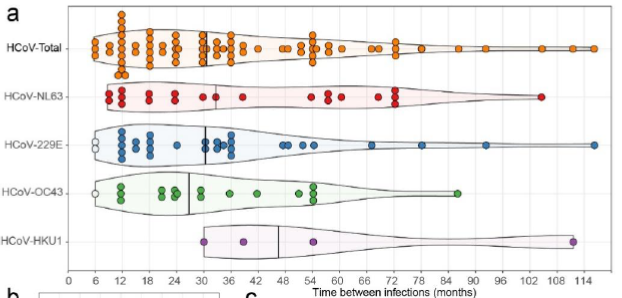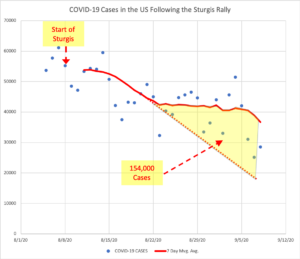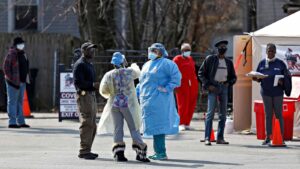We are all waiting for the SARS-CoV-2 vaccine. It might take a year. It might take two. But it might be wise to prepare for the possibility of no vaccine at all. What if SARS-CoV-2 is more like HIV than Smallpox. Two papers, just released as preprints, suggest we may need to consider a future of coexistence with COVID-19.
One study, which started in 1985, followed ten subjects for an average of twenty years, taking blood samples every six months. Those samples were recently analyzed for antibodies to four different coronaviruses. These viruses cause colds, not pneumonia, but are structurally and genetically similar to SARS-CoV-2. All ten subjects had been infected by at least three of the viruses. Some were infected many times by the same virus. One person was infected by the same virus 12 times. In four cases, a person had antibodies to a particular virus that was gone just six months later. In other words, immunity did not last, sometimes disappearing in less than a year.
None of these viruses was SARS-CoV-2, which causes COVID-19, but a study from Wuhan, also released today found that 10% of large group of COVID-19 patients from that city had no antibodies to the virus. Only 4% of health care workers without a history of symptoms had antibodies. A British Study conducted shortly after the peak of the outbreak in Birmingham found that 17% of asymptomatic healthcare workers were seropositive for antibodies. This may mean that infection control was better in China, but it could also mean that antibody levels have faded among asymptomatic infections given the longer time interval since the disease peak in Wuhan.
Taken together, these papers raise the possibility that immunity to this virus may fade over time. In particular, they may mean that antibodies generated in response to milder infections may not last. In the British Study, asymptomatic infections had a weaker antibody response than those with severe disease. Perhaps those with few symptoms or no symptoms will lose their antibodies, and can become reinfected. Or, perhaps, the virus will be tougher to get rid of than we think. It is even possible that we might have to learn how to live with this virus. Hopefully, that will not prove to be the case, but we need to have it on our radar. That means our hope may rely on treatment or perhaps on a series of vaccines such as we currently use for the flu. As this story unfolds we will need to pursue every possible option.



